Two Falls (Nishu Takuatshina) review
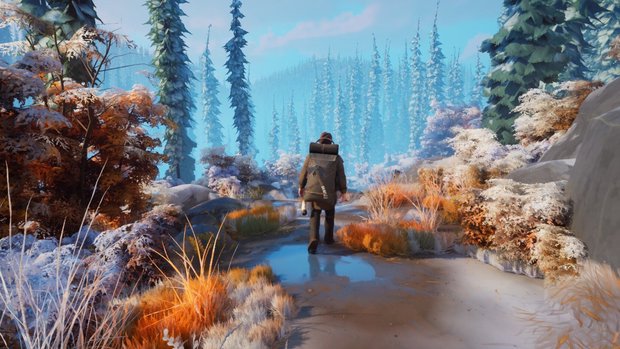
- 0 Comments
A fascinating exploration of the rising tensions between two distinct cultures in seventeenth-century New France
In seventeenth-century North America, Indigenous nations and European settlers came into contact, creating a cultural exchange defined by both cooperation and tension. Indigenous peoples such as the Innu, Wendat and Haudenosaunee (in recent decades also referred to as the “First Nations”) viewed the land as central to their identity, while for European colonists it represented opportunity and purpose. French settlers, in particular, were drawn by economic prospects like the fur trade and sought to build networks and alliances with Indigenous communities while also advancing missionary aims through Catholic orders. These different values shaped interactions that ranged from collaboration—trading skills and resources—to disputes over land, governance, and belief systems. Over time, both sides faced the challenge of preserving tradition, faith, and mutual respect as they adapted to a changing reality.
This is the backdrop for Two Falls (Nishu Takuatshina), developed by Unreliable Narrators. A largely exploratory game with underlying narrative elements, it tells the parallel stories of Maikan, an Innu hunter, and Jeanne, a French settler. The gameplay is never particularly deep, but its high production values and intuitive playability draw players into a turbulent time and place in history, characterized by a complex and often tense cultural clash between European settlers and the First Nations, intriguingly presented from different (at times competing, even opposing) perspectives.
Maikan is strongly connected to his ancestral cultural, spiritual, religious and environmental heritage. When an unsettling shift begins to affect the forest—marked by the disappearance of a rare wolf pelt and the eerie presence of something called the “Winter Spirit” causing early seasonal changes like frost, mist, and wilted flowers— Maikan sets out to investigate. His search takes him deep into the wilderness and eventually brings him into contact with European settlers for the first time.
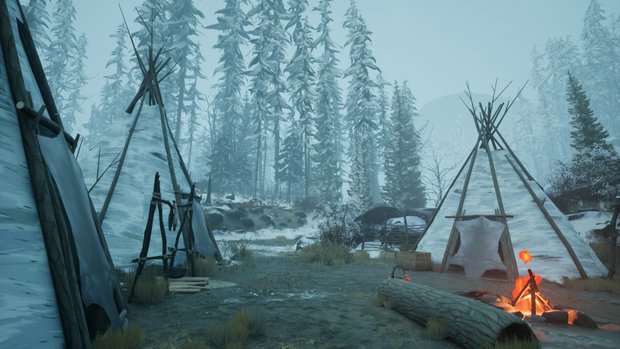
Jeanne is one of the Filles du Roi (“daughters of the king”)—a group of around 800 women, mostly orphans or of low social standing, sent from France to New France with all expenses (including dowries) covered by the state. Their mission was to marry, help populate the colonies, and support the demanding work required by life in New France. Tragically, before she ever reaches land, Jeanne finds herself the sole survivor of a shipwreck somewhere along the Saint Lawrence River. She is accompanied by, and forms a deep bond with, the ship’s dog, whom she affectionately calls Capitaine. Her voyage to Quebec through the vast, untamed territories puts her in the path of fur traders, hunters, missionaries, and some of the Innu tribes.
Two Falls is divided into seven chapters titled with a term from First Nations’ culture. Among these are “Ussi – Takuatshin” (“autumn’s beginnings”), Kashpishkau (“ground made brittle by autumn’s hoarfrost”) and “Nishu Takuatshina,” the game’s alternate title, which translates as “two autumns.” Each chapter takes place in a different time and place along the protagonists’ respective journeys as they’re driven by their own distinct goals. Maikan is focused on calming the Winter Spirit’s grudge, while Jeanne is doing all she can to reach her destination.
As Maikan is roaming the woods in search of answers, he comes across tracks he describes as “not Innu moccasins,” followed by a trail of blood leading to a slain wolf. At this point he realizes what has happened, and what must be done to make amends. In the parallel narrative, Jeanne is forced to come to grips with her plight. Instead of playing the damsel in distress, she braces herself and willingly (or so it seems) stands up to the hardships she encounters—not least of which is being a woman alone in a predominantly male world. She is driven by a mix of survival instincts, strong faith, determination, and a search for meaning in an unfamiliar and threatening land.
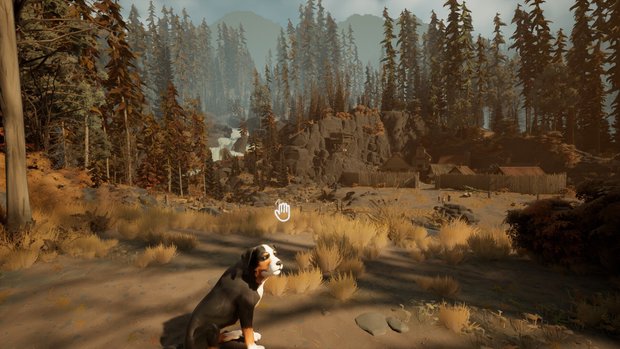
Gameplay is simple, with first-person navigation done with the WASD keys or gamepad. The left mouse button is used for selecting a response (like accepting an offer or choosing a topic for conversation) or an action (such as whether to save a man trapped under a burning beam). It is also used, at some points, to dodge fallen trees along the way, examine objects, or get somebody’s attention. Interactive points are very clearly marked and cannot be missed, and although there is a certain amount of free roaming, you can never get lost. If you stray too far from the designated trail, there will always be something to block your progress – boulders, trees, cliffs, or unsurpassable rivers. When following someone (for instance, Maikan’s Innu guide, friend and interpreter Tehonwastasta) or a person is following you (like when Pierre the fur trader trails Maikan), once you get too far away, your companion stops and either calls you or patiently waits for your return. When playing as Jeanne, there are some instances when Capitaine himself guides you in the right direction.
The visuals in Two Falls are one of its strongest features, offering detailed and immersive environments that showcase the natural beauty of the area. The 3D forests are well-rendered, with dense trees, colourful flowers, winding rivers, and layered lighting that give the world a strong sense of place. Seasonal changes are handled thoughtfully: summer brings rich greens and dappled sunlight, autumn introduces warm reds and browns, while winter covers the landscape in snow and soft light. Each season subtly shifts the mood without feeling overdone, helping to reinforce the tone of the story and the changing emotional states of the characters. The actual design of those characters, however, is somewhat less polished. Though lip synching is almost perfect, facial expressions seem to be limited, and gestures and movement quite stilted.
Everyone has their own backstory but they are not particularly detailed, their roles instead representing archetypal elements in the unfolding story of New France. For example, while the game does not elaborate on the life of Pierre, the fur trader whose path crosses those of both Maikan and Jeanne, he symbolizes the cultural conflict, and later the bridge, between European settlers and local peoples. He also represents the hard, cruel reality of life in the wilderness. Tehonwastasta, a key mediator between Indigenous groups and European newcomers, strives to foster trust and mutual respect, though he often finds himself growing increasingly frustrated by and weary of the colonists’ behaviour. Tehonwastasta reflects the challenges of building relationships across cultures when history and power are deeply uneven. His character walks the line between genuine goodwill of the local peoples, and the sobering awareness that goodwill alone may not change entrenched attitudes.
Despite the lack of elaborate backstories, the characters are complex, believable and relatable. Before long they become like good friends whose past you don’t know much about. Their motives are understandable, their actions make sense, and they have their own flaws, all of it consistent with the game’s larger world. Maikan, for example, is suspicious of Pierre stealing the white wolf’s pelt, but at the same time he may treat the trader’s wounds—as instructed by his great grandfather’s spirit. Jeanne has ambivalent feelings about reading the Bible at a time some branches of the church forbade women from even opening the book, yet her belief is strong and she is anxious to learn from it.
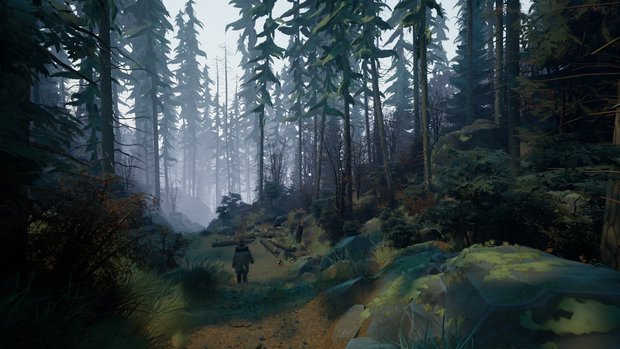
There are no actual puzzles in Two Falls; no cryptic messages to decipher, arcane locks to open, or ancient mechanisms to build or activate. Focus here is on exploring, learning and understanding the two distinctly different cultures. Indeed, at some points the game feels like a hike in the woods, such as when Jeanne is following Pierre, or at a later stage when Maikan guides the trader across the ridge. In these instances you can really feel the vastness and beauty of the wilderness, almost to the point of smelling fallen decomposing leaves and breathing the clean fresh air.
An important feature of the game is its Codex, a database containing detailed information about the characters encountered, local flora and fauna, locations and history. The Codex is divided into two parts: Maikan’s and Jeanne’s. In Maikan’s you can learn about the much-feared Winter Spirit, Indigenous funeral rites, Yarrow (an important medicinal plant) and the significance of caribou, among other topics. In Jeanne’s section there are entries about such things as the city of Quebec, chokecherry and Toussaint (All Hallows' Day). Each entry is preceded by personal reflections of the relevant character. Though not critical to gameplay, the Codex is an interesting and easily digestible tool for broadening your knowledge of the subject matter, as well as adding more layers to the narrative and understanding the motives of some characters.
Sound design and music in Two Falls are outstanding. Ambient sounds, like rushing rivers, rustling leaves, crackling fires, and distant wildlife are excellent, forming an essential part of the overall game experience by adding depth and realism to make the world feel alive. The score was composed by Indigenous musician Eadsé and incorporates soulful wind instruments, rhythmic drumming, and haunting chants to reflect the emotional and cultural journeys of the two protagonists. Jeanne’s parts feature tense background tones that are symbolic of her fear and isolation, while Maikan’s are grounded in vibrant Indigenous melodies that feel deeply connected to the land. The soundtrack blends Indigenous and European classical motifs, reinforcing the game’s dual perspective and bringing the seventeenth-century setting to life.
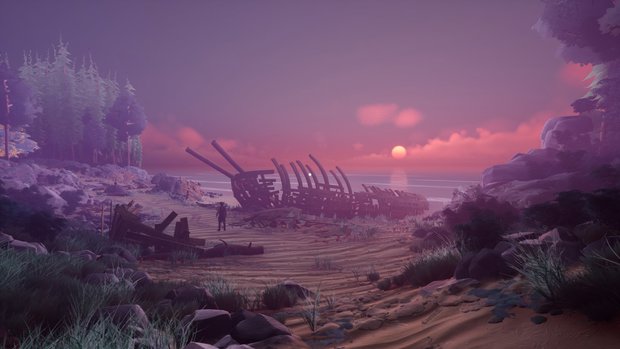
I won’t give anything away, but the music also makes for some deeply emotional moments. One of them even brought tears to my eyes. For example, there’s a moment where you’re walking through the forest with Pierre, the score gently building in the background. It’s a warm, emotional accompaniment as he talks about over-hunting, and it adds a subtle feeling of connection and reflection. It’s one of those simple scenes that ends up hitting harder than you’d expect. Another is when Jeanne must decide whether to knowingly do something that’s potentially dangerous to the Indigenous people or directly defy the Jesuit priest who insists on it. Neither choice is clean; both come with moral cost. The game doesn’t frame it as a clear right or wrong; it forces you to sit in that discomfort. What elevates this moment even further is the music as a dramatic, forlorn tune plays quietly in the background—its low, drawn-out strings reflecting Jeanne’s inner conflict. It’s not loud or intrusive but effectively carries the weight of her decision, conveying a sense of hopelessness and pressure, as if the forest itself is holding its breath.
The voice acting in Two Falls is also very good, adding a lot to the game’s vibe. Indigenous actors were cast to play the Indigenous characters, a decision that makes the performances feel real and respectful. It’s clear the developers wanted to honor the culture and bring authenticity to the story. Jeanne’s voice actor is great too. She perfectly conveys a mix of fear, determination, and vulnerability, making the young woman’s journey feel honest and easy to connect with. Overall, the voice work does a great job of bringing the characters and their stories to life in a way that feels both powerful and genuine.
One complaint I have is the annoying autosave feature, which seems to be too trendy these days. The overall game time is fairly short, between three to five hours, but as progress is recorded only at certain checkpoints, you cannot return to the exact point where you left off if you stop anywhere in between. As a result, you may find yourself replaying some sequences or sitting through conversations you've already experienced. Since there doesn’t appear to be a way to skip dialogue (at least, I couldn’t find one), there were one or two occasions for me that it became a bit tiresome.
Your choices matter, but the main story stays on a set path and doesn’t have multiple endings, even though it might seem like it would. Instead your decisions change how certain scenes play out and how characters react to you, especially in tough, morally tricky moments, like choosing to follow orders or go with your gut. It might not completely change the outcome, but it does shift how the moment feels and what it says about your character. Even this little bit of roleplaying adds some depth and may give you a reason to replay and see things from a different angle.
It’s worth noting that Two Falls contains some strong language throughout, including frequent use of the F-word and other swear words. While definitely not a horror game, it does feature images of, and references to, blood and death, which of course was done to make the setting as realistic as possible. Finally, during the game’s climax, there is a particularly harrowing sequence that may not be suitable for younger or more sensitive players.
Final Verdict
While gameplay is on the lighter side, the emotional impact, cultural authenticity, and immersive visuals and audio design make Two Falls (Nishu Takuatshina) a unique and moving experience. It is also an educationally enriched game that is designed to engage players while enhancing their knowledge about a subject that may be unfamiliar to those in other parts of the world. If you're into slow, story-driven games with real atmosphere and heart, this one’s worth your time.
Hot take
More of a narrative-driven game than a traditional adventure, Two Falls (Nishu Takuatshina) offers a uniquely immersive, emotional and compelling experience, exploring a culturally intriguing historical time and place.
Pros
- Excellent visuals, music and audio design
- Emotional story with believable characters
- Explores a subject that is not generally well known
- Extra educational value
Cons
- Simple gameplay with no actual puzzles
- Not much character backstory
- Annoying autosave with no apparent option to skip dialog lines
Eran played Two Falls (Nishu Takuatshina) on PC using a review code provided by the game's publisher.

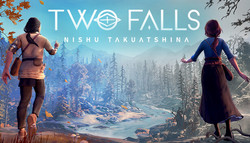
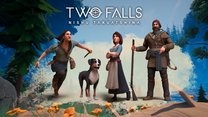


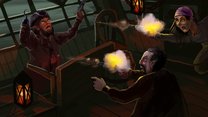


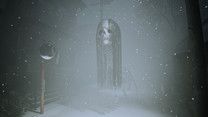

0 Comments
Want to join the discussion? Leave a comment as guest, sign in or register in our forums.
Leave a comment